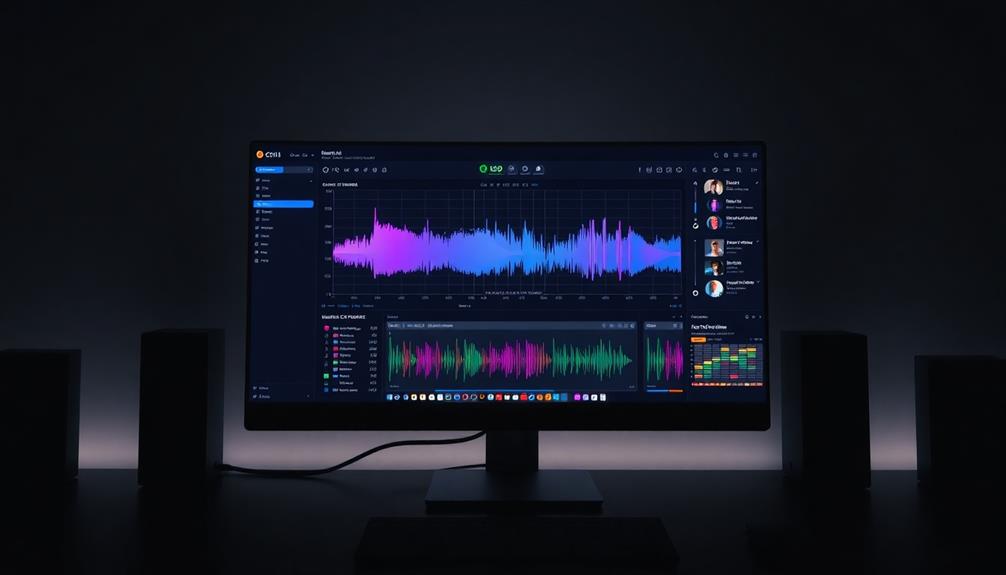To set up cloud storage for seamless music production, start by choosing a provider that works well with your operating system and offers great features, like encryption and collaboration tools. Organize your music files with a clear folder structure, so you can quickly find what you need. Monitor your internet speed to avoid connectivity issues, and backup your projects locally for added security. Keep an eye on subscription costs and consider combining cloud with local storage to optimize your workflow. These strategies will streamline your music production process, and there's more to discover that can enhance your experience even further.
Key Takeaways
- Choose a compatible cloud provider that integrates well with your music production software for seamless access to projects across devices.
- Organize your music files with a structured folder system to enhance file management and quick retrieval during production.
- Implement robust backup strategies, including local backups and encryption, to safeguard against data loss and unauthorized access.
- Optimize file sizes and plan transfers during off-peak hours to improve upload/download speeds and maintain productivity.
- Regularly reassess your storage needs and monitor usage to manage subscription costs effectively while ensuring data accessibility.
Choosing the Right Cloud Provider

When you're choosing the right cloud provider for your music, it's important to take into account compatibility with your operating system. If you're using a Mac, Apple iCloud is your best bet, while Windows users will find Microsoft OneDrive more suitable.
Each cloud provider offers unique features that can enhance your music production experience, such as encryption for security, collaboration tools for sharing files, and bundled services like iCloud with Apple Music for added convenience.
Next, consider the pricing structures of these services. Costs can vary widely, with plans starting around $10/month for 2TB on iCloud, so it's vital to find a plan that fits your budget and needs.
You should also look for cloud providers that integrate smoothly with your music production software, making it easy to access projects across devices and streamline your workflow.
Organizing Your Music Files

Selecting the right cloud provider sets the stage for effective file organization, which is essential to a smooth music production process. Start by creating a structured "Artists" folder in your cloud storage.
Include sub-folders for "Mixes," "Videos," "Invoices," "Sessions," and "Graphics." This organization enhances project retrieval efficiency and keeps your work streamlined.
For better access, store MIDI files in a dedicated folder, ensuring they're easy to manage within your music projects. You can also utilize direct access to your cloud storage from your digital audio workstation (DAW), like Ableton.
This setup minimizes file retrieval time and keeps your workflow intact. Implementing a systematic naming convention for your files and projects is vital.
This practice helps you quickly search for and locate files, reducing the chances of losing important samples.
Addressing Connectivity Issues

When you're working on your music, internet speed can make or break your workflow.
It's essential to optimize your internet connection and consider offline storage solutions for those times when connectivity issues arise.
Internet Speed Optimization
Connectivity plays an essential role in a musician's workflow, and optimizing internet speed can make all the difference in maintaining productivity. Recent global disruptions, such as the Microsoft outage, can serve as a reminder of how vital a reliable connection is for transferring large files and maintaining creative momentum. To ensure seamless collaboration and efficient project handling, musicians must pay close attention to their network setup. Adjusting network settings for online musicians—such as prioritizing bandwidth for audio streaming and file uploads—can prevent frustrating lags or interruptions during critical sessions. By fine-tuning these settings, artists can focus on their craft without the distraction of technical hiccups.
Poor internet access can hinder your ability to transfer large files, slowing down your creative process. To tackle this, plan your file transfers and downloads during off-peak hours. This strategy can help you avoid server congestion and maintain a steady connection.
If you have access to 5G technology, take advantage of the faster download speeds. Just remember that you might face data limits and slower upload speeds, which can still affect your efficiency.
To further enhance your internet speed, optimize your file sizes before uploading. Compression and encryption can slow down transfers, so keeping files as lightweight as possible makes for quicker uploads.
While gigabit internet speeds can be beneficial, they're not always available when you're on the go. This is where portable SSDs come in handy, allowing for fast data transfer and easy access to your music assets.
Maintaining a reliable connection is essential, but having backup solutions guarantees you can work seamlessly, even outside the studio.
Offline Storage Solutions
Offline storage solutions are essential for musicians facing connectivity challenges. Relying solely on the internet can lead to frustrating interruptions, especially during vital production phases. Utilizing external hard drives or portable SSDs allows you to keep your projects handy while ensuring data safety. Here's a quick comparison of some offline storage options:
| Storage Type | Speed | Portability |
|---|---|---|
| Portable SSDs | Fast data transfer | Highly portable |
| External Hard Drives | Moderate speed | Less portable |
| USB Flash Drives | Variable speed | Very portable |
Ensuring Data Security

When it comes to ensuring data security, you need to implement solid backup strategies that go beyond just using cloud services.
Consider encrypting your sensitive files before uploading them, as this adds an extra layer of protection against unauthorized access.
Despite the general reliability of cloud providers, staying aware of their limitations will help you make informed decisions about your data management.
Backup Strategies for Musicians
As you navigate the complexities of music production, implementing effective backup strategies is vital for safeguarding your work. Start by maintaining regular local backups on external hard drives. This step is paramount, as cloud providers often have limited recovery options for deleted files after a 30-day period.
Additionally, consider the benefits of merchant services that can help streamline your payment processes when managing your music sales. Consider subscribing to a reliable cloud storage service like iCloud, which offers affordable plans (such as $10/month for 2TB) to help manage your audio content efficiently.
It's wise to stick with a single primary cloud provider; this streamlines your backup management and reduces confusion about where your data is stored. For quick data transfers and offline access to your music assets, utilize portable SSDs. This guarantees that critical files are available even when you don't have internet connectivity.
Encryption for Data Protection
While backing up your music projects is important, protecting those files from unauthorized access is equally essential. Using encryption is a fundamental measure to guarantee your sensitive audio files and music projects stored in cloud storage remain secure.
Many providers like iCloud and Dropbox offer end-to-end encryption, meaning your files are encrypted both during transit and at rest, which enhances data security.
To maximize protection, opt for strong encryption algorithms such as AES (Advanced Encryption Standard) with a 256-bit key. This level of security safeguards your digital assets against potential breaches.
However, managing your encryption keys securely is imperative. Losing access to these keys could lead to permanent data loss, so keep backup copies in a safe location.
Regularly review and update your encryption practices to stay ahead of potential threats. Pairing encryption with secure passwords and two-factor authentication considerably boosts the overall security of your cloud-stored music projects.
Cloud Provider Reliability Factors
How can you guarantee that your music projects are safe in the cloud? First, focus on cloud provider reliability. Before you commit to a service, research the provider's history of data protection.
While data loss reports are rare, you don't want to risk your hard work. Check if the provider offers adequate recovery options; many only allow a 30-day recovery for deleted files. This highlights the importance of having local backups on external hard drives.
Next, consider the security features of the cloud service. Consumer-grade Network Attached Storage (NAS) solutions may not provide the security you need, making reputable cloud providers a better choice.
Managing Subscription Costs

Managing subscription costs for cloud storage can feel overwhelming, but it doesn't have to be. By understanding your storage needs and budgeting wisely, you can navigate the world of cloud services without breaking the bank.
Here are some practical tips to help you manage your costs effectively:
- Evaluate your needs: Determine how much storage you genuinely require. Monthly costs for cloud services typically range from $10 to $100 for 1-2 TB.
- Stay informed: Keep track of subscription changes and pricing fluctuations to maximize your value and avoid unexpected expenses.
- Compare providers: Regularly compare features and costs among different cloud providers. Leverage competitive pricing to find the best deal that suits your needs.
- Utilize free options: Consider free versions of cloud services for basic storage needs, but be cautious, as they often have limited capacity.
- Balance storage options: Combine cloud storage with local backups on external drives to manage costs while ensuring your data is safe and accessible.
Comparing Cloud and Local Storage

When weighing your options for storing music projects, it's important to compare cloud storage with local storage solutions. Cloud storage services usually cost around $100 per year for 1-2 TB, providing great accessibility across multiple devices.
However, local storage has become more affordable, making it an appealing choice for many musicians.
In a music production environment, immediate access to your files is vital. Local storage guarantees you won't face latency issues that could disrupt your workflow.
Plus, many musicians keep local copies of their projects to avoid complications with "missing samples" in software like Ableton. This highlights the significance of maintaining local storage alongside cloud solutions.
Another consideration is the fluctuating subscription costs of cloud services. Local storage offers a one-time purchase benefit, eliminating ongoing fees and the need for careful budgeting.
By combining both cloud and local storage, you can optimize your workflow. Use cloud services for collaboration and sharing while relying on local storage for quick access and reliability when it matters most.
Balancing these options allows you to manage your music projects effectively without compromising on speed or accessibility.
Enhancing Collaboration in Music Production

Enhancing collaboration in music production hinges on the effective use of cloud storage platforms. By utilizing services like Dropbox or Google Drive, you can effortlessly share large audio files and collaborate on projects in real-time.
This not only boosts your workflow efficiency but also allows you to access projects from multiple devices, making shifts between home studios, rehearsal spaces, and live setups seamless. To further enhance your collaborative efforts, consider exploring unique strategies for monetizing your music that can be integrated into your workflow.
To maximize your collaboration, consider these tips:
- Use real-time features: Get instant feedback and make adjustments on the fly.
- Organize folders: Set up designated sub-folders for different project elements to keep everything tidy and accessible.
- Leverage bundled services: Platforms like iCloud with Apple Music integrate tools that simplify teamwork.
- Communicate regularly: Keep in touch with your collaborators to guarantee everyone's on the same page.
- Backup frequently: Utilize cloud storage to automatically save your work, minimizing the risk of losing progress.
Frequently Asked Questions
What Is the Best Storage Solution for Music Producers?
The best storage solution for music producers depends on your needs. You'll want reliable cloud storage for accessibility and backups, while also considering local options for offline access. Evaluate pricing and features to find your ideal fit.
What Is the Best Cloud for Music Producers?
When you need collaboration, try Google Drive. It lets you and your bandmates edit tracks in real-time, streamlining your creative process. Ultimately, the best cloud storage depends on your workflow and device compatibility.
Can I Store My Music in the Cloud?
Yes, you can store your music in the cloud. Services like iCloud, Google Drive, and Dropbox let you access your projects from anywhere, making collaboration easier and helping you manage your audio files efficiently.
How Much Storage Is Enough for Music Production?
You'd think a few gigabytes would suffice for your masterpieces, but alas! For serious music production, aim for at least 1TB to 2TB. You'll need room for those epic 100GB albums and countless samples!
Conclusion
By embracing cloud storage, you're setting yourself up for a smoother music production journey. Remember, "a stitch in time saves nine"—investing a bit of effort now in organizing your files and choosing the right provider will save you countless headaches later. With the right tools and practices, you'll enhance collaboration, secure your data, and keep costs manageable. So take the leap, and let the cloud elevate your musical creations to new heights!










